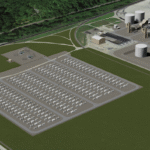<h1>Strengthening Grid Infrastructure: The Role of Smart Meters</h1>
<p>The power grid is the backbone of our modern society, providing the energy needed to power homes, businesses, and industries. However, as our energy demands continue to rise, the grid infrastructure faces numerous challenges, including grid reliability, efficiency, and security. One solution that has gained significant attention is the implementation of smart meters, which play a critical role in strengthening grid infrastructure.</p>
Challenges in Traditional Grid Infrastructure
<p>Traditional grid infrastructure has been in place for decades, and while it has served us well, it is not without its limitations. One of the primary challenges is its manual nature, which relies heavily on human intervention for consumption tracking, billing, and fault detection. This results in inefficiencies, lost revenue, and prolonged downtime.</p>
<p>Other challenges include the aging of the grid infrastructure, high maintenance costs, and susceptibility to cyber threats. According to the U.S. Department of Energy, nearly 70% of the grid infrastructure is more than 25 years old, making it vulnerable to reliability issues and failures. Cyber attacks on the grid can have devastating consequences, disrupting power supply and impacting economies.</p>
The Role of Smart Meters in Strengthening Grid Infrastructure
<p>Smart meters, also known as advanced metering infrastructure (AMI), are a key component of strengthening grid infrastructure. By integrating advanced technologies, smart meters enable real-time data collection, automated consumption tracking, and remote monitoring of energy usage. This translates to improved grid efficiency, reliability, and security. </p>
<p>The benefits of smart meters in strengthening grid infrastructure are multifaceted. First and foremost, they provide granular data on energy usage, enabling utilities to pinpoint areas of inefficiency and optimize energy distribution. Second, smart meters facilitate demand response programs, which reduce peak demand and minimize grid strain. Third, they enable remote monitoring, enabling utilities to detect faults and outages in real-time, reducing downtime and response times. Finally, smart meters provide a secure means of data transmission, shielding against cyber threats. </p>
Saving Energy and Reducing Costs
<p>Smart meters enable real-time monitoring of energy consumption, allowing consumers to optimize their energy usage and reduce waste. By tracking their energy usage, consumers can identify areas of inefficiency and make informed decisions to reduce their energy consumption. This results in reduced energy bills and a decreased demand on the grid, further strengthening grid infrastructure. </p>
<p>Additionally, smart meters enable utilities to optimize energy distribution, ensuring that energy is distributed where it is needed most. This reduces energy waste and minimizes the strain on the grid, leading to cost savings and a stronger grid infrastructure. </p>
Improving Grid Reliability and Security
<p>Smart meters also improve grid reliability and security by enabling real-time monitoring of energy distribution. With real-time data, utilities can detect faults and outages in real-time, enabling swift response and reduced downtime. This reduces the impact of outages, protecting consumers and businesses, and minimizing economic losses. </p>
<p>Moreover, smart meters provide a secure means of data transmission, shielding against cyber threats and protecting sensitive consumer data. This ensures that consumer data remains confidential and secure, while also safeguarding against potential cyber attacks on the grid. </p>
Challenges and Opportunities in Smart Meter Implementation
<h2>Challenges and Opportunities in Smart Meter Implementation</h2>
<p>While smart meters have numerous benefits, their implementation is not without challenges. One of the primary concerns is the cost of upgrading existing infrastructure, which can be a significant burden on utilities and consumers. However, the long-term benefits of smart meters far outweigh the initial costs. Additionally, the implementation of smart meters requires careful planning and execution to ensure seamless transition and minimal disruption to energy supply. </p>
<p>Another challenge is data management and analytics, which requires advanced technologies and skills. Utilities must be equipped to handle the influx of data generated by smart meters, and develop the capabilities to analyze and utilize the data effectively. However, this also presents opportunities for innovation and growth, as utilities can leverage big data and analytics to drive new business models and services. </p>
Opportunities in Smart Meter Implementation
<p>The implementation of smart meters also presents opportunities for innovation and growth. Utilities can leverage big data and analytics to drive new business models and services, such as real-time energy pricing, energy efficiency programs, and predictive maintenance. Additionally, smart meters enable the integration of distributed energy resources, such as solar and wind power, into the grid, improving grid resilience and reducing dependence on fossil fuels. </p>
<p>Moreover, smart meters can be used to enable new business models, such as demand response programs, which pay consumers for reducing their energy usage during peak periods. This not only reduces grid strain but also provides new revenue streams for utilities. Finally, smart meters can facilitate the integration of electric vehicles into the grid, reducing range anxiety and promoting a cleaner, more sustainable energy future. </p>
Conclusion
<p>Strengthening grid infrastructure is critical to ensuring reliable, efficient, and secure energy supply. Smart meters play a vital role in achieving this goal by enabling real-time data collection, automated consumption tracking, and remote monitoring of energy usage. By leveraging smart meter technology, utilities can reduce energy waste, optimize energy distribution, and improve grid reliability and security. Additionally, smart meters present opportunities for innovation and growth, enabling new business models, services, and technologies to emerge. As the demand for energy continues to grow, the implementation of smart meters is essential to securing a sustainable energy future.</p>
FAQs
<h3>What are smart meters, and how do they work?</h3>
<p>Smart meters are advanced technologies that enable real-time monitoring of energy consumption. They use wireless communication networks to transmit energy usage data back to the utility, which can then be analyzed to optimize energy distribution and identify areas of inefficiency.</p>
<h3>What are the benefits of smart meters?</h3>
<p>Smart meters provide numerous benefits, including improved grid efficiency, reliability, and security, real-time energy usage data, automated consumption tracking, remote monitoring, and demand response programs. They also enable utilities to optimize energy distribution, reduce energy waste, and improve customer engagement and satisfaction.</p>
<h3>What are the challenges in implementing smart meters?</h3>
<p>The primary challenges in implementing smart meters include upgrading existing infrastructure, data management and analytics, and change management. Utilities must invest in new technologies, processes, and training to support the implementation of smart meters, which can be a significant burden. Additionally, the implementation of smart meters requires careful planning and execution to ensure seamless transition and minimal disruption to energy supply.</p>
<h3>What are the security risks associated with smart meters?</h3>
<p>Smart meters, like all advanced technologies, pose some security risks. The remote monitoring and data transmission capabilities of smart meters increase the risk of cyber attacks and data breaches. Utilities and consumers must take steps to ensure the security and confidentiality of smart meter data and protect against potential cyber threats.</p>
<h3>What are the next steps in smart meter implementation?</h3>
<p>The next steps in smart meter implementation involve refining data analytics and predictive models, integrating smart meters with other grid technologies, and developing new business models and services. Utilities must also continue to invest in cyber security and data management infrastructure to ensure the long-term success of smart meter technology. </p>
<h3>What is the future of smart meter implementation?</h3>
<p>The future of smart meter implementation is promising. As the demand for energy continues to grow, utilities will increasingly rely on advanced technologies like smart meters to optimize energy distribution and reduce waste. Smart meters will play a critical role in enabling the integration of renewable energy sources, electric vehicles, and other innovative energy solutions. </p>
<h3>How do smart meters impact consumer energy usage?</h3>
<p>Smart meters impact consumer energy usage by enabling real-time monitoring of energy consumption. This enables consumers to optimize their energy usage, reduce waste, and make informed decisions about energy consumption. Smart meters also provide consumers with valuable insights into their energy usage, enabling them to adjust their behavior and reduce energy costs. </p>





.png?w=150&resize=150,150&ssl=1)

.png?w=150&resize=150,150&ssl=1)